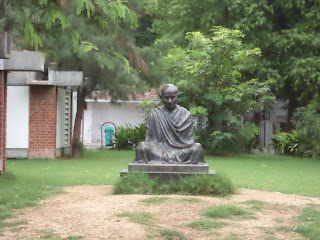Team member Julia Meyer writes about her thoughts at the Gandhi Ashram:
Piling seven people
into a five person car (and five people into an eight person van), we finally made our way to the Gandhi
Ashram. The premise is modestly
designed: a series of bungalows overlooking blue, algae coated water. The lake, now polluted, is entirely
still. I leaned my torso forward
over the concrete ledge. My vision
of the immobile pool was perfectly framed by bridges supporting two-wheelers
cascading their course.
 |
| The Mahatma's Room |
 There
was something about the image of the stagnant water encapsulated by the hurried
vehicles. Modernity rushing
forward, pulling nature to a stagnant stop. It was painful to watch, but there was something beautiful
about the serenity of dead water.
I pulled out my camera to capture the moment. Fumbling over the composition, I struggled to include both
bridges and the detail of the algae coated blue. I finally had to settle for two separate images: the first
looked directly down towards the water, the second was broader view of the
land-scape, however, even within these two photographs the color was less vivid
and the lens was too far to capture the motion of the crazed two-wheelers. Once the shot was on my camera the
impact had disintegrated and the moment was meaningless.
There
was something about the image of the stagnant water encapsulated by the hurried
vehicles. Modernity rushing
forward, pulling nature to a stagnant stop. It was painful to watch, but there was something beautiful
about the serenity of dead water.
I pulled out my camera to capture the moment. Fumbling over the composition, I struggled to include both
bridges and the detail of the algae coated blue. I finally had to settle for two separate images: the first
looked directly down towards the water, the second was broader view of the
land-scape, however, even within these two photographs the color was less vivid
and the lens was too far to capture the motion of the crazed two-wheelers. Once the shot was on my camera the
impact had disintegrated and the moment was meaningless.
The
previous night I had just finished reading Susan Sontag’s Regarding the Pain of Others, where she describes the fleeting power
of a photograph. Unlike a
painting, a photograph claims to render the truth. The viewer sees the image, is forced to consume the “diet of
horrors,” but once the photograph is removed from their field of vision the
viewer moves on, apathetically able to return to the routine of their daily
lives. The impact of these
photographs is completely ephemeral.
Not only does the viewer quickly forget the power of what they have
seen, the image also leaves them feeling helpless and unable to make any sort
of change.
Last
Friday in the workshop I was conducting we began a discussion about the
difference between sympathy and empathy.
One of the participants explained how it is obviously easier to
sympathize than it is to empathize.
She eloquently described how empathy doesn’t mean one has experienced
said event, but it does mean that they are able and willing to imagine it. Looking at these two images on the
screen of my puny digital camera I’ve began to wonder the power of a
photograph.
For the past month all
of the ITSA interns have been seriously committed to divergent, creative
thinking, yet in many of the workshops I’ve found myself incorporating photographs
and videos. Of course, these are
intended to motivate the students and when I watch the series of images I
myself feel empowered to make a change.
But how long does the memory of these images last? Our visual recollection is much weaker
than the memory of our other senses and I worry that the moment the video or
slide-show is turned off the sentiment will fade. We don’t have to smell a
simulation. A photograph does
nothing for the imagination.
Sympathy is as ephemeral as a bubble and without the chance to
internalize the pain, empathy is left dry. These students are overloaded with images to a point where
they’re rendered meaningless.
Occasionally there is the image that does manage strike a cord. It will vibrate inside you for a moment
like the string of a guitar shooting up your spine. Traveling through your ears, it fills your brain with a
painful hum, but as the vibrations simmer the sound numbs. Imagination, however, digs us deeper
and deeper into despair. Embodied
pain has a way of sticking to the soul and it’s our ringing core that pulls us
into action.











